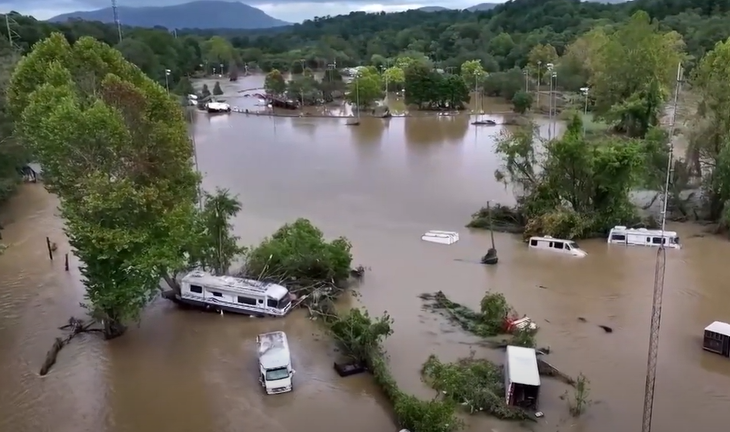Hurricane Helene: A Taste of Things to Come?
From September 26-29 2024, Hurricane Helene swept across five US states, breaking records and leaving devastation in its wake.
Over four days, its effects on the southeastern USA were profound: intense rainfall and winds led to severe flooding and landslides, killing at least 140 people and leaving entire towns without power, access, and clean water. Helene caused an estimated $145 – $160 billion in damage and economic losses, potentially making it one of the costliest disasters in US history.
Growing intensity
There is strong evidence that hurricanes of such strength become more likely with climate change. Helene is the eighth Category 4 or 5 hurricane to hit the US in the last eight years; prior to 2016, the US saw the same number over a much longer timespan of 57 years. A clear ramping up of intensity is happening, and is expected to continue. Hurricane Helene was also remarkable for the speed at which it gathered strength, rising through the ranks from a Category 1 to a Category 4 storm in under a day.
In terms of why climate change makes hurricanes more likely, ocean water temperature is a significant factor. The oceans have absorbed about 90% of the global warming caused by climate change, and the North Atlantic is a strong focal point. Hurricanes have their origins in warm water: as warm surface water evaporates rapidly and condenses in the atmosphere, the air reaches saturation point and a tropical depression forms. These tropical depressions can build to become tropical storms, and later hurricanes, if these warm water conditions persist.
Late September sea surface temperatures in the Gulf of Mexico, where Helene originated, were as warm as 32 degrees Celsius (89 degrees Fahrenheit) – the hottest on record and 126% of the typical average for the time of year. Both climate change and El Niño contributed to these record-breaking temperatures, creating the ideal conditions for a ‘supercharged’ storm. Such storms gather intensity very rapidly, and are able to persist for longer after making landfall, meaning they can progress further inland.
Wind and rain
Climate change also makes hurricanes wetter, which makes them more dangerous. Until recently, the majority of the damage caused by hurricanes has been through intense wind speeds, but now storm surges and rainfall are accounting for a growing proportion of damage, for which many communities are less prepared. A hotter climate appears to make hurricanes move more slowly, which means that a greater amount of rainfall is released onto the areas it passes.
Hurricane Helene was defined by flooding, bringing record-breaking rainfall to Georgia and the Carolinas. In western North Carolina, almost 75 cm of rainfall fell in a matter of days, leading to major floods in towns such as Asheville, previously described as a ‘climate haven’ due to a perception of protection from climate impacts. Atlanta was issued a flash flood emergency warning for the first time ever, following 28 cm of rain falling in 48 hours. These communities, previously sheltered from the worst impacts of climate change, lack the preparedness for grappling with such disasters.
Sea level rise also magnifies the effects of hurricanes, bringing more seawater further inland. When Helene made landfall in Florida, it was accompanied by a record-breaking 4.5 metre storm surge. A study from earlier in 2024 indicated storm surges in the region have grown by 80% in area since 1979.
What happens next?
Once the winds have died down and the floodwaters receded, the long-term consequences of such disasters emerge. Infrastructure will take time to repair, and floods leave behind a dizzying array of health hazards, including water-borne pathogens, mould and disease outbreaks, and dangerous debris. The impacts on mental health can be profound, as the scale of loss and difficult journey to recovery become apparent, with PTSD and anxiety commonly associated with such disasters.
Many communities struck by Helene, especially in Florida, were still recovering from previous hurricanes. Inability to recover between natural disasters makes economic stability and development increasingly difficult. Insurance premiums also rise, as properties and infrastructure are deemed liabilities to insure; the average price of home insurance in Florida jumped by 43% between 2018 and 2023. Further inland, property owners who previously didn’t consider flood insurance are facing the costs of rebuilding without insurance payouts.
Preparing for a future where such disasters are more frequent and more intense requires a focus on adaptation and resilience. There are a suite of building adaptations that can help, including stormwater management, independent power supplies such as solar panels, and backup clean water supplies – demonstrated in Babcock Ranch, dubbed Florida’s first hurricane-proof town. Resilience can be fortified through nature-based solutions, such as conservation and restoration of mangrove forests and wetlands, which are highly effective at mitigating damage from storm surges. It is also necessary to acknowledge that hurricane-prone areas will simply become more dangerous and expensive places to live, which should be a strong consideration when considering further development, especially along coastlines.
For 2024, the hurricane season continues until the end of November, and further powerful storms remain a strong possibility. Alongside continued global efforts to mitigate climate change, there is an urgent need for governments and communities to prioritise adaptation and resilience efforts, to minimise risks for communities, infrastructure, and livelihoods.
- Related Hurricane Helene (Wikipedia)
- Study: Helene will likely cause thousands of deaths over decades
